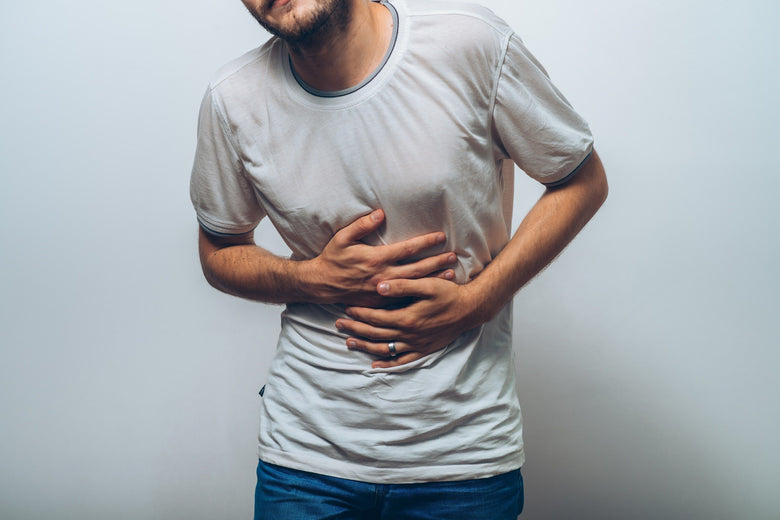Do you love coffee but hate how it makes you feel in the gut?
You’re not crazy, nor are you unhealthy.
Even though coffee is linked to a variety of health-positive trends such as reduced risk of certain kinds of cancer, more efficient metabolism, and better liver health, many people experience a negative side as well.
An upset stomach.
There are several reasons why coffee gives some of us an upset stomach. One of them is completely in your control, but a couple aren’t.
Whether you’re experiencing discomfort that you can affect or not, my goal is to give you the knowledge you need to enjoy your brew to the fullest. And to reach top-notch enjoyment, you need to know your options if your coffee brings you stomach discomfort.
Let’s look at three common causes and what you can do about them.
1. Your Stomach Is Sensitive To Coffee’s Acids
Our digestive systems run on acids. They’re the fuel of the machine that breaks down what we consume. We’ve got to have them!
However, too much gastric acid can be a problem, causing some not-so-fun symptoms.
Most of these issues manifest in the form of bloating, belching, and general discomfort. Though considered mild symptoms, they’re quite annoying.
Many articles out there claim that drinking coffee can lead to acid reflux, an involuntary series of muscle movements that send gastric acid up into the esophagus. However, this connection has long been disproven (thank goodness).
If you find yourself with similar discomforts when you drink acidic drinks like fruit juice or alcohol, it’s worth cutting out acidic foods and drinks for a few days to see if you notice a difference.
If acid seems to be the issue, here’s what you can do to still enjoy your coffee:
- Find low-acidity, stomach friendly coffees. If it seems you’re only slightly sensitive but you still want to try reducing acids, opt for coffee beans that are known to be lower on the acidity scale. Coffees grown at low altitudes typically have lower acid levels.
- Cold brew. Cold brewing coffee in cold water (instead of hot water like normal) reduces the acid levels of the final drink as much as 66%. Once you’ve brewed the concentrate, you can still cut it with hot water to enjoy a hot mug like normal.
May The Grind Be With You with Amazons #1 manual grinder
However, even if you brew coffee with a lower acidity, you’ll probably run into problems. You see, coffee only has a ph level of about 5, which is actually very close to carrots. It’s not that acidic on its own - so it’s typically not the acids that cause the issue.
It’s the caffeine that really upsets most stomachs.
2. Your Stomach Is Sensitive To Coffee’s Caffeine
I don’t mean to confuse you, but the caffeine in your daily mug encourages your stomach to produce more acid than usual.
So, even though the coffee itself may not be too acidic for you, the caffeine may boost your acid production over the comfort line.
But the caffeine molecule on its own is already considered a stomach irritant. Due to the laxative effect, it forces your digestive system to work faster. It’s like your system wants to get the caffeine out as quickly as possible (which is why coffee is often suggested to counteract constipation).
Yeah, okay, we’re getting into some weird territory here, so I’ll stick with this:
- Caffeine can be the catalyst for some of those acid-related issues
- And it brings along its own discomforts
For most people, caffeine is the real issue.
Here are a few ways you can counteract the discomfort of caffeine.
- Try specialty-grade decaf. No, I’m not a “death before decaf” kind of guy anymore. Once I discovered that there’s excellent, specialty-grade decaf coffee, I quickly gave up that slogan.
- Drink less coffee. If you tend to down three to five cups per day, I think it’s safe to say that cutting that down to one or two will bring about some major improvements. You may not think you can handle it, but it’s worth at least trying to see if it makes your daily coffee experience more pleasant.
- Eat a banana. Bananas are alkaline and cancel out the harshness of the extra acids created by caffeine. They also contain a variety of substances that sooth the stomach on their own.
Read: Why You Need To Be Drinking Coffee Black (And How To Start)
Of course, even if you’re not someone who's a little extra sensitive to acid or caffeine, you’re still going to run into issues if you do this next thing...
3. You’re Drinking Coffee On An Empty Stomach
Here’s the thing: coffee is an intense drink. It’s rich, bold, and complex in flavor and chemical makeup. If you’re drinking coffee without eating anything substantial for breakfast, you’re going to run into problems - no matter who you are.
What do you think those extra acids and caffeine molecules are going to do without food?
Upset your stomach, of course!
I suggest taking notes on how you feel after different breakfasts. For example, if cereal and milk with your coffee still leaves you with a bit of discomfort, you’ll know you need to add in a bit more substance like a banana or protein.
Read: Coffee And Health: The Good And The Bad
Play with your mornings for a couple weeks and see what works for you.
For the best cup of coffee, grind your beans fresh each morning with JAVAPRESSE GRINDER!





